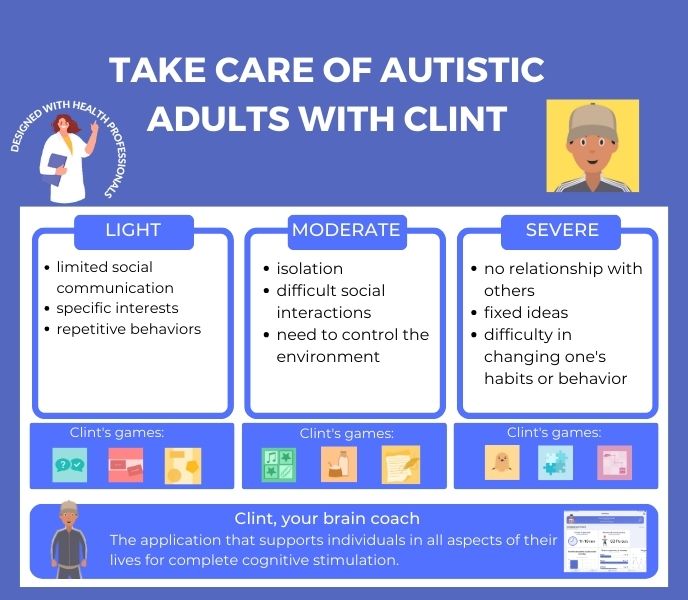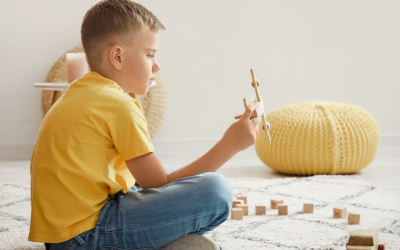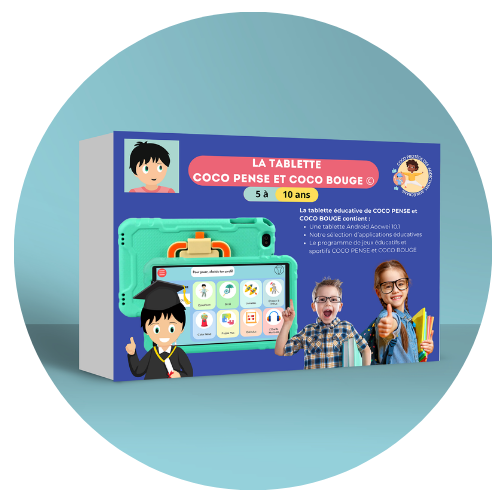You don’t understand why routines have to be established with autistic people? Having trouble understanding this lifestyle? Find out more about the routines autistic people need! Ready to learn more? This is the place to be!
Why does an autistic person need a routine?
Living with autism can present unique and complex challenges. Among the many facets of daily life for people with autism, establishing and maintaining routines plays a crucial role. In this article, we’ll explore in depth why routines are so essential for people with autism, examining the benefits they offer and providing concrete examples of their positive impact.
Understanding the importance of routines for people with autism
- Challenges of unpredictability for people with autism : People with autism can find it particularly difficult to cope with the unpredictability of their environment. For many, sudden changes or unexpected events can be a source of anxiety and confusion. Unlike some people who can easily adapt to new situations, people with autism may have difficulty understanding and integrating abrupt changes in their daily routine.
Unpredictability can take many forms, from minor changes in daily schedules to more significant events such as moves or changes in family structure. For a person with autism, even a seemingly minor change can cause significant distress and upset their emotional balance.
For example, imagine an autistic teenager who follows a strict schedule every day after school: he comes home, has a snack, does his homework, then plays video games for a while before dinner. If one day, his family spontaneously decides to announce an after-school family outing without warning, this can disrupt his entire routine and trigger an anxiety attack.
-
Need for stability and security: People with autism can often feel a deep need for stability and security in their environment. For many, the world can seem chaotic, unpredictable and hard to understand. Sudden changes or new situations can trigger anxiety, as they disrupt the sense of control and familiarity that autistic people seek. Visit routines provide a structured, predictable framework that helps alleviate this anxiety. By following regular, familiar sequences of actions, people with autism can feel more in control of their environment and better prepared to face everyday challenges. This predictability enables them to plan their actions and know what to expect, thus reducing their anxiety and stress.
For example, an autistic child who follows a precise routine every morning before going to school: get up at the same time, have breakfast, get dressed, brush his teeth, then leave for school. This routine provides a reassuring structure that enables her to start her day in a calm, organized way. In the absence of this routine, he may feel disoriented and anxious, which could affect his ability to function effectively.
Benefits of routines for people with autism
- Anxiety reduction: Anxiety is a daily reality for many people with autism, and routines play a crucial role in managing this challenge. By providing a predictable, familiar structure, routines help to alleviate the feelings of uncertainty and anxiety that can arise when the world seems chaotic and unpredictable. When people with autism know what to expect in their day, they can feel more in control of their environment and better prepared to face challenges as they arise. This can reduce their anxiety levels and enable them to navigate their daily lives more effectively.
Let’s take the example of an autistic adult working in an office. By following a well-established morning routine – getting up at the same time, taking the same route to work, and starting the day with specific tasks – this person can feel calmer and more confident at the start of their working day. This routine gives her a sense of predictability and stability, which enables her to better manage the demands of her job.
- Improved concentration and performance: people with autism can often find it difficult to concentrate and maintain their attention, particularly in environments where uncertainty and change are omnipresent. Routines provide structure and predictability that help to alleviate these challenges and promote better concentration and performance in various areas of life. By eliminating the distractions of unpredictability, routines enable people with autism to channel their energy and attention more effectively. Rather than constantly having to adapt to new situations or unexpected changes, they can focus on the tasks in hand with greater clarity and efficiency.
What types of routines can be set up?
What’s more, routines provide a stable, familiar framework that can help reduce performance anxiety. By knowing what to expect in different situations, people with autism can feel more confident in meeting challenges and expressing their full potential.
It’s important to note that a person with autism may have routines at different levels, extending far beyond simple schedules or daily activities. To better understand the importance and diversity of these routines, let’s look at a few specific aspects:
1. Outputs :
Going out is an essential part of everyday life for many people, including those with autism. For a person with autism, it’s crucial to have precise times to know when they’ll be taken to and from school, or when they’ll be taking part in other planned activities. This predictability helps reduce the anxiety associated with uncertainty, and enables the person to better prepare mentally for these events.
2. New people :
Introducing new people into the life of a person with autism can be a source of stress and anxiety. Whether at school, in a social context or at home, meeting new people can disrupt an autistic person’s established routine. It’s important to take this sensitivity into account and introduce new people gradually, providing information beforehand and creating a safe, reassuring environment.
3. New locations :
People with autism can be sensitive to changes in their environment, even in familiar places. Visiting new places can be frightening and destabilizing for them. So it’s crucial to plan visits to new places carefully, providing advance information about what to expect and respecting the autistic person’s need to maintain a certain routine and predictability, even in new or unfamiliar contexts.
4. Organizing the family environment :
Organization and routine within the family environment are very important for people with autism. Activities such as mealtimes, shower times and bedtimes need to be regular and predictable. This allows the autistic person to feel secure and in control of their family environment, promoting emotional well-being and stability.
By understanding and respecting these different facets of autistic people’s routines, we can help create environments that promote their comfort, safety and fulfillment. Adapting our approach to take account of these specific needs can make a significant difference to the daily lives of these individuals.
What if the routine in question becomes a daily problem?
While routines can offer stability and comfort to a person with autism, it’s important to recognize that in some cases they can become excessively rigid and create difficulties. When a person with autism becomes independent, they may fear losing their established routines or no longer being as organized as they’d like. In such situations, a proactive approach is essential to manage routines appropriately and prevent them from becoming an obstacle to daily well-being.
Here are some strategies to consider if an autistic person’s routine is a problem:
-
Change routines gradually: When routines start to become too rigid or restrictive, it can be beneficial to introduce minor changes gradually. For example, slightly altering the order of daily activities or introducing new ones can help to broaden the autistic person’s range of flexibility and reduce over-dependence on routines.
-
Encourage adaptability: Encourage people with autism to develop adaptability skills by teaching them strategies for managing unexpected changes and adjusting to new situations. This can include stress management techniques such as deep breathing or positive visualization, as well as concrete ways of planning and organizing activities without being entirely dependent on pre-established routines.
-
Promote autonomy and independence: Encourage the autistic person to make decisions and take an active part in planning his or her own routines. This can help reinforce her sense of autonomy and give her more control over her daily life. Involve him in discussing adjustments to his routines, and listen carefully to his concerns and needs.
-
Offer emotional and practical support: Be alert to signs of distress or anxiety related to routines, and offer emotional and practical support to the autistic person. This can include open discussion of concerns, relaxation sessions or consultations with mental health professionals who specialize in supporting people with autism.
By implementing these strategies and adopting a proactive, collaborative approach, it’s possible to effectively manage an autistic person’s routines and promote their overall well-being. The aim is to strike a balance between structure and flexibility, enabling autistic people to fully develop in their daily lives.
A tool to improve the quality of life of an autistic person

In the context of managing routines and supporting people with autism, innovative tools have been developed to meet their specific needs. My Dictionary is one of these tools, a tablet-based application designed to help beneficiaries express their wishes and needs in an efficient, personalized way.
My Dictionary offers a practical, accessible solution to help people with autism communicate their wishes, preferences and needs in a variety of everyday contexts. The application offers a bank of images organized into 6 main themes, covering a wide range of situations and activities. These themes are fully customizable, allowing each user to create a visual vocabulary tailored to their specific needs and interests.
With My Dictionary, people with autism can use images to express their food choices, favorite activities, emotions, comfort needs, social interactions and much more. By using images rather than words, the app offers an alternative, augmentative communication method that can be more easily accessible for many people with autism, especially those who have difficulty with verbal language.
By offering a practical, customizable means of visual communication, Mon Dictionary helps improve the quality of life of people with autism by giving them a voice to express their needs and preferences. By integrating this tool into daily routines and social interactions, it is possible to promote the inclusion and well-being of people with autism, offering them an effective means of participating fully in the life of their community.
AND FOR FURTHER INFORMATION

COCO, FOR AUTISTIC CHILDREN
COCO is a program adapted for autistic children that offers a collection of educational and cognitive games. Increasing level of difficulties let the children progress at its own pace. Also a mandatory sports break every 15 minutes of screen time to avoid addiction.
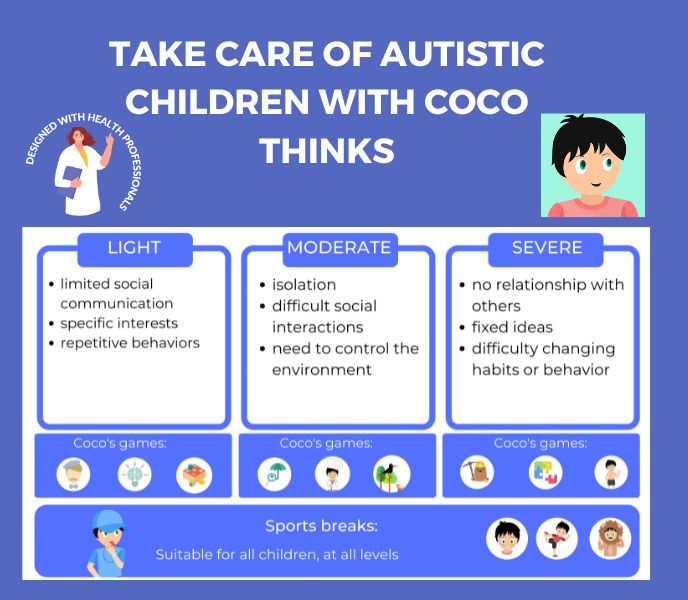
CARING FOR AN AUTISTIC CHILD
In this guide, we’ll give you practicals advice on how to support a child suffering from Autism and how to stimulate and bond with them. Useful day-to-day tips to make life easier for family and professional caregivers.
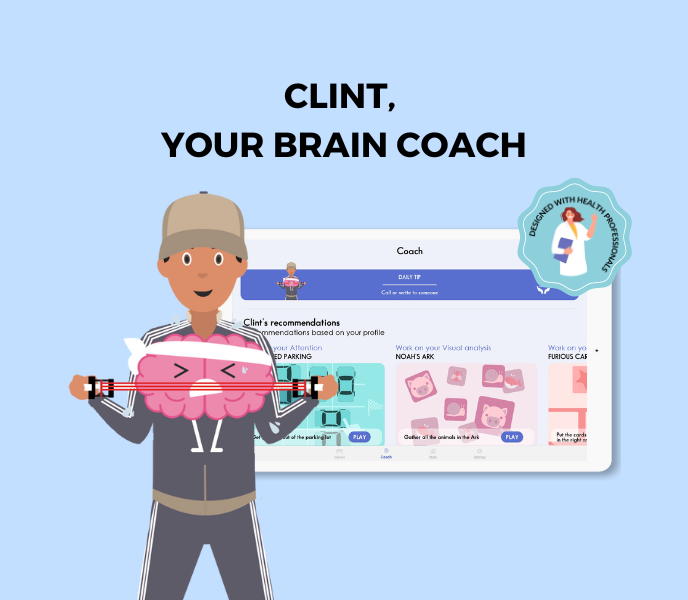
CLINT, FOR AUTISTIC ADULTS
Adapted for adults affected by autism , the CLINT program offers different games in order to develop the knowledge, improve concentration and strengthen mental capacities. CLINT has been designed to be accessible for everyone, and keep a close-eye to the mental health.
Other articles that might interest you:
Using Technology to Enhance Communication in Autism Speech Therapy
Autism Spectrum Disorder (ASD) presents unique challenges in communication, making speech therapy an essential...
Effective Autism Behavior Therapy: Improving Outcomes
Autism is a complex neurodevelopmental disorder that affects individuals in various ways. It is characterized by...
Autism Therapy at Home: Effective Strategies
Autism Spectrum Disorder (ASD) is a neurodevelopmental disorder that affects individuals in various ways. It is...


